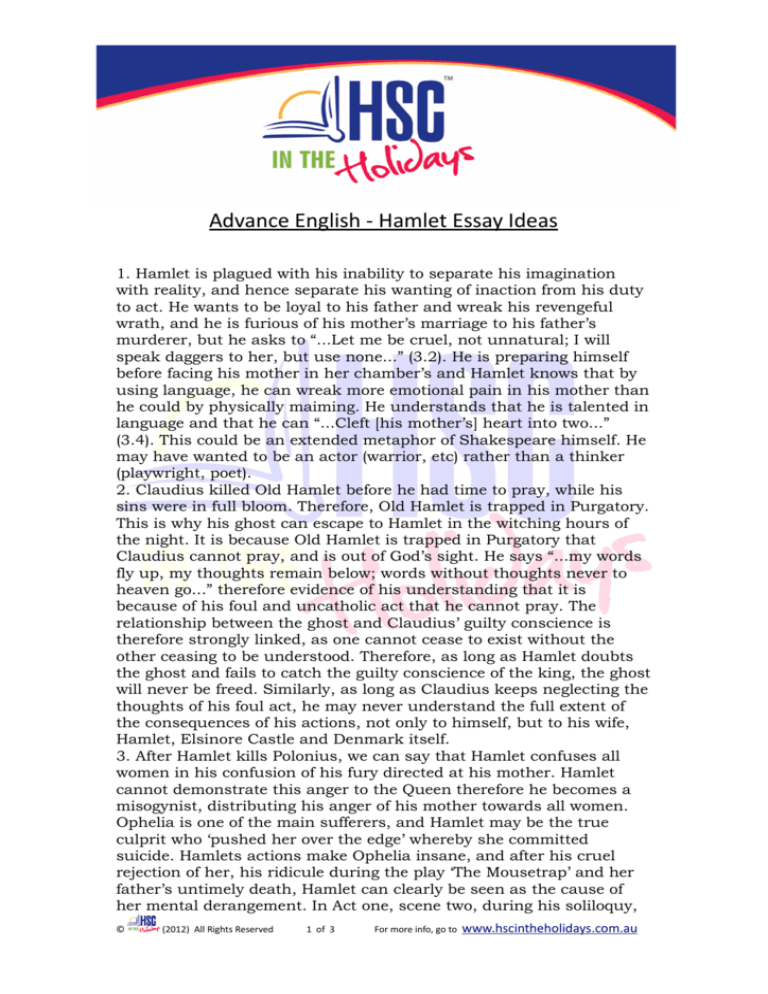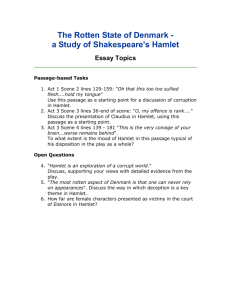
Advance English - Hamlet Essay Ideas
1. Hamlet is plagued with his inability to separate his imagination
with reality, and hence separate his wanting of inaction from his duty
to act. He wants to be loyal to his father and wreak his revengeful
wrath, and he is furious of his mother’s marriage to his father’s
murderer, but he asks to “...Let me be cruel, not unnatural; I will
speak daggers to her, but use none...” (3.2). He is preparing himself
before facing his mother in her chamber’s and Hamlet knows that by
using language, he can wreak more emotional pain in his mother than
he could by physically maiming. He understands that he is talented in
language and that he can “...Cleft [his mother’s] heart into two...”
(3.4). This could be an extended metaphor of Shakespeare himself. He
may have wanted to be an actor (warrior, etc) rather than a thinker
(playwright, poet).
2. Claudius killed Old Hamlet before he had time to pray, while his
sins were in full bloom. Therefore, Old Hamlet is trapped in Purgatory.
This is why his ghost can escape to Hamlet in the witching hours of
the night. It is because Old Hamlet is trapped in Purgatory that
Claudius cannot pray, and is out of God’s sight. He says “...my words
fly up, my thoughts remain below; words without thoughts never to
heaven go...” therefore evidence of his understanding that it is
because of his foul and uncatholic act that he cannot pray. The
relationship between the ghost and Claudius’ guilty conscience is
therefore strongly linked, as one cannot cease to exist without the
other ceasing to be understood. Therefore, as long as Hamlet doubts
the ghost and fails to catch the guilty conscience of the king, the ghost
will never be freed. Similarly, as long as Claudius keeps neglecting the
thoughts of his foul act, he may never understand the full extent of
the consequences of his actions, not only to himself, but to his wife,
Hamlet, Elsinore Castle and Denmark itself.
3. After Hamlet kills Polonius, we can say that Hamlet confuses all
women in his confusion of his fury directed at his mother. Hamlet
cannot demonstrate this anger to the Queen therefore he becomes a
misogynist, distributing his anger of his mother towards all women.
Ophelia is one of the main sufferers, and Hamlet may be the true
culprit who ‘pushed her over the edge’ whereby she committed
suicide. Hamlets actions make Ophelia insane, and after his cruel
rejection of her, his ridicule during the play ‘The Mousetrap’ and her
father’s untimely death, Hamlet can clearly be seen as the cause of
her mental derangement. In Act one, scene two, during his soliloquy,
©
(2012) All Rights Reserved
1 of 3
For more info, go to
www.hscintheholidays.com.au
he says “...Frailty, thy name is woman...” and this shows that his
attitude towards women only began to turn sour after he discovered
his mother’s marriage, where “...the funeral bak’d meats did coldly
furnish the marriage tables...” (1.2).
4. It is Hamlet’s Renaissance qualities that he hates of himself. He
knows that he is a ‘thinker’, as opposed to someone who carries out
his thoughts through action, and he understands that “...There is
nothing either good or bad, but thinking makes it so...” (2.2). Yet he
undermines his shining qualities and thinks of himself as a “...rogue
and peasant slave...” (2.2) who “...like a whore, must unpack [his]
heart with words...” (2.2). The rotting of Denmark may therefore be
directly related to the internal rotting of Hamlet, as he is churning his
own mad, leading to madness. The cause of this of course, is the
Ghost, and we may never be sure as to if it actually exists, or if it is a
figment of Hamlet’s grievous imagination. (Also discuss language hereShakespeare’s double entendre’s, metaphor’s (Hyperion, Satyr), the
use of allusion and symbolism (flowers with Ophelia representing
different event sequences) and their true motif or meaning). “You are a
fishmonger” may be taken literally (Polonius talks a lot) or
metaphorically (he will most likely sacrifice his daughter for a
promotion in status).
5. Freud believed that Hamlet held incestuous desires towards his
mother, which he labelled the Oedipal Complex. This is Freud’s view,
and my interpretation does not parallel his. It is my understanding
that his anger towards his mother for marrying Claudius so soon is
because of misogyny. As the play progresses, and Hamlet’s speeches
grow wilder, we also see that his attitude toward women in general
also turns sour. His hatred of his mother is directed onto Ophelia,
telling her to “...get to a nunnery...”(3.1), a deliberate pun. He could be
meaning an actual nunnery, where she cannot break another man’s
heart by telling him “...rich gifts wax poor when givers prove
unkind...”(3.1). Ophelia demoralises him, making him feel worthless of
any woman’s love, after asking himself “...To be or not to be...”(3.1).
6. Hamlet’s strongest weapon of defence is his words. Through
language, he finds solace and even amusement at the expense of other
character’s confusion. His speeches may be perceived as being “...Too
long...”(2.2) and “...pregnant sometimes...”(2.2) by Polonius, ironically.
Shakespeare himself finds shelter in language, and perhaps the
reason for why we think Hamlet is mad is because he realises that he
cannot use this method of defence to his advantage. This can be
inferred with “...break, my heart, for I must hold my tongue...”(1.2)
and then “...the rest is silence...”(5.2).
1. Hamlet and Claudius both over-think, but whilst Claudius overacts, Hamlet under-acts. They are both Renaissance men, with
Renaissance values, and Hamlet is indecisive as to whether he
should kill the King or not, because he may actually LIKE the
King.
©
(2012) All Rights Reserved
2 of 3
For more info, go to
www.hscintheholidays.com.au
Something is rotten in the state of Denmark.
Marcellus, Act I, scene iv
There is nothing either good or bad, but thinking makes it so.
Hamlet, Act II, scene ii
O! what a rogue and peasant slave am I!
Hamlet, Act II, scene ii
The play's the thing,
Wherein I'll catch the conscience of the king.
Hamlet, Act II, scene ii
To be, or not to be, — that is the question: —
Hamlet, Act III, scene i
Call me what instrument you will, though you can fret me, you cannot play
upon me.
Hamlet, Act III, scene ii
get yet to my lady's chamber, and tell her, let her paint an inch thick, to this
favour she must come; make her laugh at that.
Hamlet, Act V, scene i
The rest is silence.
Hamlet, Act V, scene ii
©
(2012) All Rights Reserved
3 of 3
For more info, go to
www.hscintheholidays.com.au








